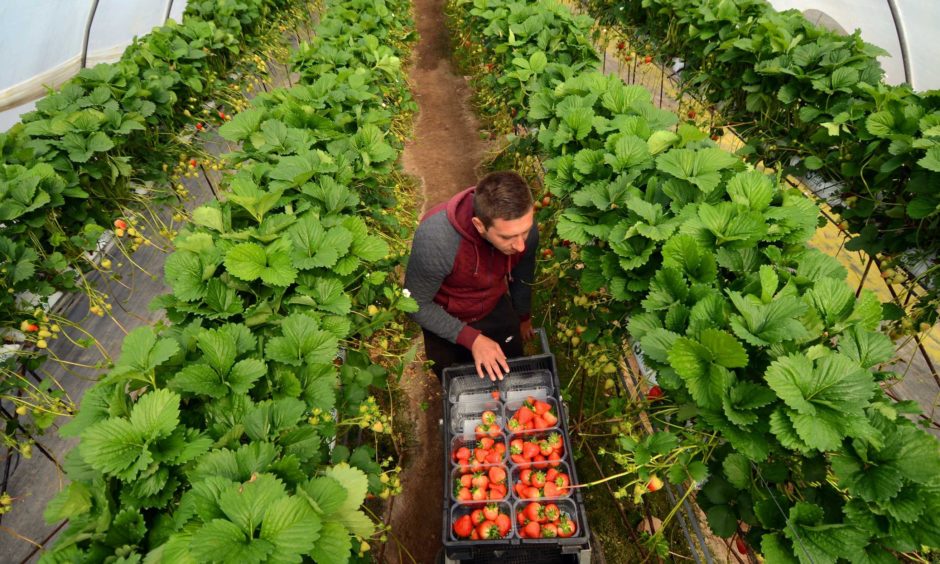The soft fruit industry’s “land army” recruitment drive is in full swing and about to be ramped up further – but local growers are warning it won’t provide the answer to all their labour problems.
Laid-off workers have responded in their thousands to appeals to help harvest fruit and vegetables and prevent crops from rotting in polytunnels and fields this summer, and a few – including students, joiners and mechanics from Dundee – have already started work on one farm in Angus this week.
However, there are fears that once the lockdown is eased and people are able to return to their careers, the industry will be left in the lurch.
That’s why NFU Scotland’s (NFUS) horticulture committee chairman and Angus grower, James Porter, is working closely with the Scottish Government to ensure scheduled flights carrying returning East European workers who signed contracts prior to the coronavirus outbreak will be allowed into the country as soon as it is safe and legitimate.
“We will never get enough local workers to meet demand, so it’s essential to adopt a two-pronged approach to the labour issue because we need workers who are skilled in berry picking and are able to train new members,” he said.
“Charter flights have also been discussed but we’d only go ahead with that when it’s safe and legal to do so. At the moment no one knows what will be happening next week, let alone next month.”
Meanwhile in Fife, strawberries from the heated tunnels at Easter Grangemuir Farm near Pittenweem are already being sold in local shops and in a farm road-end vending machine, and farmer Sally Brown says the 40 Romanian and Bulgarian pickers who returned to work in early February are coping with the harvest for now.
However, she needs 170 workers at the peak of the season, and has already signed up 50 local people who responded enthusiastically to the campaign on social media and on the NFUS employment portal.
“I’ve had heart-wrenching conversations with dozens of people who are out of work and getting desperate,” she said.
“We’ve had applications from pilots, hospitality workers, cleaners and fishermen from the East Neuk, but because of social distancing rules we can’t offer accommodation to everyone and have to be selective, so I’m focusing on local people.
“It’s impressive how they have rallied round, but I just hope they can stick at the job once they start because it’s hard work and our regular workers are out in tunnels from early in the morning six days a week. There’s also the worry that we could have a small army recruited then when they get a whiff of work somewhere else they’ll leave.”
The industry is investing time in drawing up guidance for growers on issues such as biosecurity and distancing, and Sally is producing an induction video to give inexperienced workers some idea of the technique and skills required.
“The work is there and if they are keen and can pick well there are benefits – and wages will go up,” she said.
James Porter said another recruitment drive would be launched in a couple of weeks, because while Angus Growers have received 4,741 applications from 2,571 individual applicants so far, only 5-15% were taking up an offer of employment.
He added: “It has taken time to go through all the responses, and on our farm, for instance, we had 300 applications but once we had contacted everyone it translated in to just 30 jobs.
“Some people had changed their minds and some were clearly unsuitable. “We still want to employ as many local people as we can but we need a balanced approach.”
Mr Porter started eight local people in polytunnels this week.
“They’re getting on fine and more are coming out next week, but in a month or six weeks’ time, when restrictions ease up the workforce will go back to their old jobs, so we can’t put all our eggs in one basket,” he said.
Meanwhile, vegetable producers like Cupar-based East of Scotland Growers are under less pressure to sign up workers as broccoli, cauliflower and cabbage crops are a long way off being ready to harvest.
The co-operative’s Growers Garden commercial manager Alan Wallace said: “We’re still a month away from having to organise workers and we have 16 growers who are widely spread out geographically which is an advantage.”










